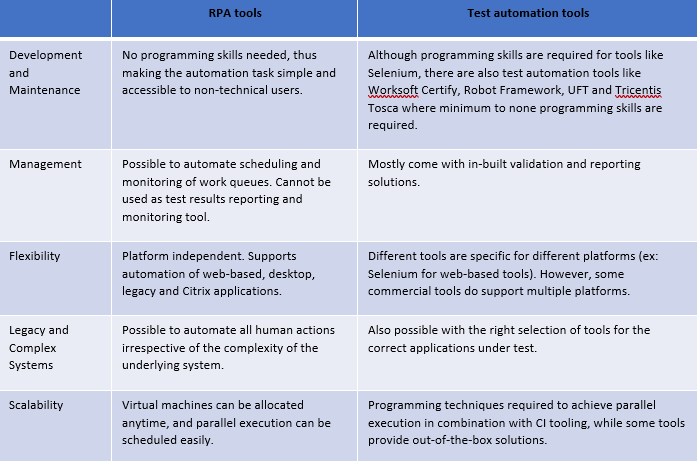Is RPA Going to Replace Human work?
Robotic Process Automation, or RPA, is the technology that enables the creation of a virtual workforce, also called software bots, to emulate human execution of repetitive and rule-based processes. This can only take place when these processes do not require manual intervention, unless it is part of the process flow, and can be scheduled and monitored from a central control room.
Due to increasing demand for business process automation, the market for RPA has seen a constant growth in size up to now and is expected to do so in the coming years.
How Has RPA Influenced Test Automation?
Test automation refers to the usage of special tools to, fully or partially, automate the process of software testing, including test execution, validation, reporting and so on.
One of the most debated questions about RPA tools among testing community members, due to its user-friendly, non-technical and business-flow-oriented nature, is:
Are RPA tools a better choice for test automation as compared to traditional test automation tools?
Before we try to find an answer to the above question, let’s look at a short comparison between RPA tools and test automation tools from technology and usage perspective.

Why You Will Also Prefer RPA Tools.
Code-less automation features seem to be the preferred reason to opt for an RPA tool over a traditional test automation tool like Selenium. However, tools like Tricentis Tosca and Worksoft Certify, where no coding is needed, leaving the competition behind anymore solely based on this feature.
With the right set of skills and customization, it is technically possible to interchange the usage of RPA tools and test automation tools.
To fully understand the requirements needed, tt is most important to understand the ‘basic purpose’ of process automation and test automation. The goal of process automation is to reduce the human effort by automating repetitive processes in production, whereas the goal of test automation is to save test time and effort by automating repetitive test cases in lower test environments.
What Does the Future Bring You?
While the future might seem a distant dot on the horizon, a more interesting and, perhaps, less-explored topic in this area would be the usage of test automation tools for testing RPA solutions.
Test data generation, functional flows within the processes, validation of test results by comparing the results generated by process and manual execution, test report generation, to name a few, could be automated in the test process.
With the right assessment and strategy, test automation solutions can play a pivotal role in increasing efficiency and reducing time-to-market in RPA projects.
How do you see Test automation?

Rashmi has over 13 years of experience in software testing with extensive expertise as a test manager in large scale separation, integration and migration programs in the finance and telecom domains. With a new found keen interest in the area of artificial intelligence and robotic process automation and a strong belief that these new technologies can change the world in more ways than we can imagine, she is eager to learn, research and with her strong testing background, be able to provide strategic, efficient and robust test solutions for AI and RPA projects
